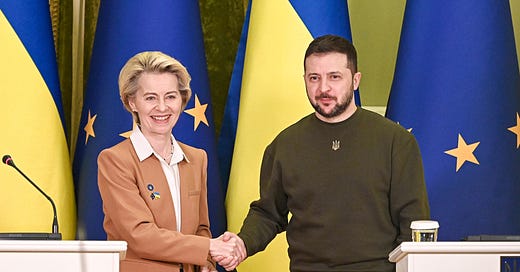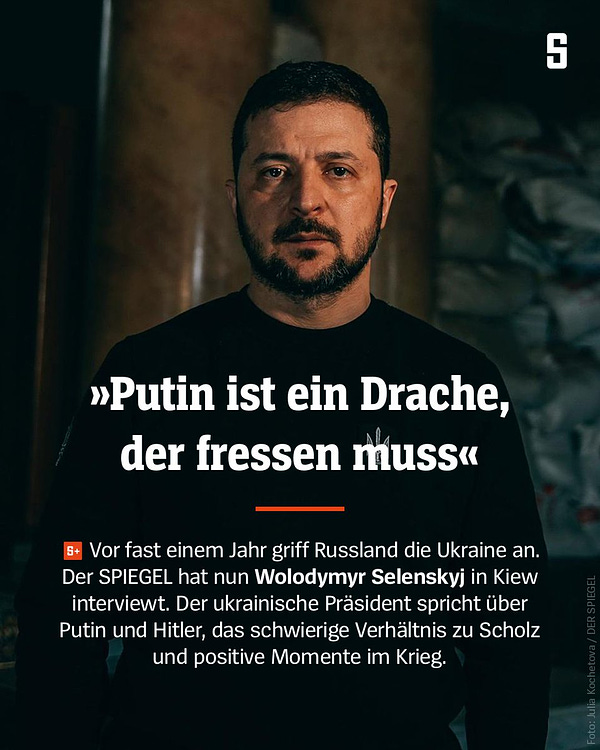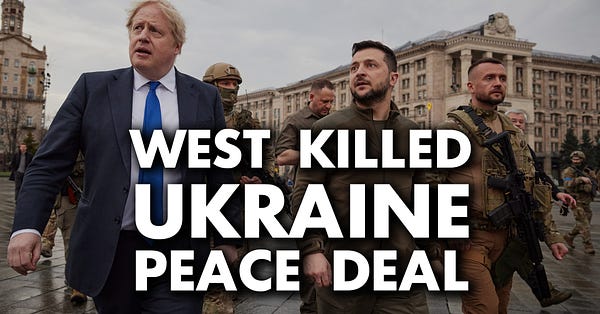Ukraine's Zelensky admits he sabotaged Minsk peace deal with Russia, West blocked negotiations
Ukraine's leader Volodymyr Zelensky admitted he refused to implement the 2015 Minsk II peace deal with Russia. Germany and France said Kiev used the agreement to "buy time" to prepare for war.
Ukraine's leader Volodymyr Zelensky admitted to a major German newspaper that he refused to implement the Minsk peace deal with Russia.
The Minsk accords were two agreements, negotiated in Belarus; signed by Ukraine, Russia, and the Organization for Security and Cooperation in Europe (OSCE); and overseen by Germany and France, in the so-called Normandy Format.
The accords aimed to stop the conflict in Ukraine that broke out following a violent US-backed coup in 2014, which set off a civil war between Kiev's pro-Western, post-coup government and pro-Russian separatists in the east.
The first deal, known as Minsk I, was reached in 2014, but failed. This led to Minsk II in 2015. This agreement was ostensibly more stable, but Ukraine's previous President Petro Poroshenko never truly implemented it.
When Zelensky ran for president, he had differentiated himself from Poroshenko by pledging to "reboot" peace negotiations with the Russian-speaking separatists in the east and "continue in the direction of the Minsk talks and head towards concluding a ceasefire".
But soon after coming to power in 2019, Zelensky did a 180.
In an interview with the German daily Der Spiegel, published on February 9, 2023, Zelensky made it clear that he intentionally chose to sabotage Minsk.
The Ukrainian leader complained that the Minsk agreements were an unacceptable "concession".
Zelensky recalled telling French President Emmanuel Macron and German Chancellor Angela Merkel that "we cannot implement it".
"Procrastination is perfectly fine in diplomacy", Zelensky said, explaining that he only "jumped on the train" and pretended to support Minsk in order to negotiate a prisoner swap with Russia - and give his country more time to prepare for war.
Merkel herself confirmed this in December 2022, in an interview with the newspaper Die Zeit.
The former German leader stated that the “2014 Minsk agreement was an attempt to buy time for Ukraine. Ukraine used this time to become stronger”.
Former French President François Hollande later commented, “Angela Merkel is right on this point”.
Hollande added: "Since 2014, Ukraine has strengthened its military posture. Indeed, the Ukrainian army was completely different from that of 2014. It was better trained and equipped. It is the merit of the Minsk agreements to have given the Ukrainian army this opportunity".
Minsk II stipulated that Ukraine had to reform its constitution, decentralize state authority, and provide autonomy for the Russian-speaking eastern provinces, with "special status" and "self-governance" for the regions Donetsk and Lugansk.
Kiev refused to do so, under both Ukrainian governments of President Poroshenko, who signed the Minsk accords, and his successor Zelensky, who took office in 2019.
Points 11 and 12 of Minsk II mandated (emphasis added):
11. Implementation of constitutional reform in Ukraine, with the new constitution to come into effect by the end of 2015, the key element of which is decentralization (taking into account peculiarities of particular districts of Donetsk and Luhansk Oblasts, agreed with representatives of these districts), and also approval of permanent legislation on special status of particular districts of Donetsk and Luhansk Oblasts, in accordance with the measures spelt out in the footnotes, by the end of 2015.
12. Based on the Ukrainian law, "on the temporary order of self-governance in the particular districts of the Donetsk and Lugansk oblasts," questions dealing with local elections will be discussed and agreed upon by representatives of the areas of the Donetsk and Lugansk oblasts within the framework of the Trilateral Contact Group. Elections will be held in accordance with the relevant OSCE standards and monitored by OSCE/ODIHR.
The Ukrainian government did not implement these measures. Zelensky has dispelled any doubt as to why: It was an intentional choice.
German Chancellor Merkel clarified what Ukraine chose to do instead: Pretend that it was going to implement Minsk II while using the time to stock up on Western weapons and train its military to prepare for war with Russia.
West blocked peace negotiations between Ukraine and Russia
Zelensky's admission that he sabotaged a peace deal with Russia came just after Israel's former leader disclosed that the West did the same.
Former Israeli Prime Minister Naftali Bennett revealed in an interview that the US and Europe "blocked" his attempt to negotiate peace between Russia and Ukraine.
In a video he published on his YouTube channel, Bennett said "there was a legitimate decision by the West to keep striking Putin", to escalate the war, instead of seeking peace.
"So they blocked it?" the interviewer asked, referring to Bennett's attempt to broker peace. And the former Israeli leader responded, "Basically, yes. They blocked it, and I thought they're wrong".
This was not the only time the West blocked peace.
In December 2021, Moscow demanded from the West written security guarantees, including the promise that Ukraine would not join NATO and that the US-led military alliance would not carry out activities in Eastern Europe, on Russia's borders.
Moscow published two draft treaties for peace. But Washington and Brussels rejected them. The US and NATO insisted that they have the right to continue expanding their aggressive military alliance onto Russia's borders.
This blatantly violated the agreement that the US, Britain, and France made with Moscow in 1990, in which the former Soviet Union allowed German reunification on the condition that NATO must not expand "one inch east". Instead, NATO added 14 new members, all in Central and Eastern Europe - some on Russia's borders.
Having exhausted all attempts at a diplomatic resolution to the conflict, Russia invaded Ukraine in February 2022.
Just a few weeks into this new phase of the war, in March, Türkiye held negotiations in Istanbul between Russia and Ukraine. Both sides came to an agreement to end the war, according to the anti-Russian newspaper Ukrainska Pravda and a former top US government official.
But British Prime Minister Boris Johnson traveled to Kiev to kill the peace deal, and the West instead escalated the proxy war, seeking to destabilize and overthrow the Russian government.










We have now reached the point where no one will believe the word of the West ! It's a disgusting world where liars who consider themselves gentlemen laugh over champagne at the fact that not a single word they say can be believed ! The more we move away from this shiny set of lies built up by robbing others, which they grandly call the "Free World", the more you can believe in that word, a cannibal from Papua New Guinea is more trustworthy than an English lord, a Bantu black if he gives his word, you can be sure of that to shut up while the puppet who is puffing himself up in the White House laughs and lies in the eyes of the voters !
hey Ben, I'm wondering what you think of Radhika Desai's comments in the recent interview with Danny Haiphong, regarding Merkel's interview, where Radhika says she read the German version of that interview and Merkel says (according to Radhika) “Yes, in retrospect, signing those Accords gave Ukraine time.” Which in Radhika's opinion is different from saying, “We intended to fool Russia all along.” Radhika also brings up, if the goal was to fool Russia, "why would Merkel have engaged in Nord Stream One, Nord Stream Two, and various other measures to make friendly relations with Russia?" https://youtu.be/CkQCSPM2QUY